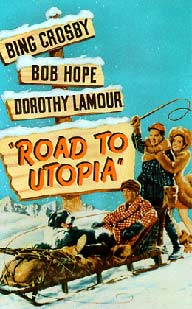|
LITR 5439 Literary & Historical Utopias |
|
Jacob A. McCleese
23 June 2013
Utopian Ideas: Beyond Fiction
The allure of utopian fiction
dates back to when Plato first penned,
The Republic.
Plato’s structural choice for this philosophical classic is a little outdated.
The novel doesn’t have any real action or plot line, and mainly centers on a
conversation between Socrates and several other philosophers as they contemplate
the details for a perfect society. This method does not satisfy modern
audiences’ need for entertaining literature. However, utopian authors still
effectively spread their ideas throughout the literary world and many of these
ideas are consistent in most throughout the genre. The three midterms I reviewed
all focus on the ideas inherent throughout utopian fiction and connect to the
course objectives in a remarkable way.
Katie Parian’s midterm exemplifies how to remain
within the parameters of the course objectives while expressing ideas. In her
introduction, and really throughout her essay, she presents original thoughts
and then cites corresponding objectives. This is effective for multiple reasons.
One, it gives the reader, me, something concrete to refer to. She’s not just
writing down unfounded ideas about utopia, she supports her thoughts with the
valuable tools laid before her, the course objectives. Second, referring to the
course objectives endears the essay to the professor. The goals for an essay,
especially for a literature student, should go beyond getting an A on a paper.
In an academic setting, however, good grades are a concern for many students,
therefore, writing a paper while focusing on the professor’s objectives is never
a bad choice.
I didn’t focus on the ideas that Katie espoused in
her essay, although they were wonderfully written. The value of her essay came,
at least for me, through her focus on the objectives, and how she made the
objectives enjoyable to read. The other essays did not do this as well. However,
they do wrestle with utopian ideas splendidly.
Dru Watkins’ essay was much
shorter than the others. However, he attempted to approach one of the more
complicated utopian ideas: the appeal of entertaining literature and the value
of informative literature. This issue was raised repeatedly in our class. While
I do not fully agree with his premise that, “children are more receptive to
being entertained than informed,” his assertion is applicable to the general
population of children. I’m sure that he’d agree that a select few children
would enjoy reading informative literature. In fact, I’d argue that the recent
obsession with dystopian fiction is a sign that children are finding information
in their own way. If students are reading novels like
The Hunger Games,
and then discussing the novel with their friends, aren’t they absorbing
information? Then are dystopian novels providing synthesis between entertainment
and information? Dru’s essay approaches this question, but stops just short of
an answer.
The last essay I read appealed to me the most. Jenna
Zucha’s essay dealt with the search for an ideal society, real and fictional.
She focuses on several conventions of utopian fiction, but most of the essay
considers the utopian need to eliminate individualism. Zucha outlines how
several pieces she read for this class,
Looking Backward,
Herland, and Utopia, emphasized the destruction
of individualism in favor of the common good. This is a theme woven into most
utopian fiction. She does a fantastic job laying out her own objections to this
utopian practice, while, again, backing up her assertions with course
objectives. Zucha spends the latter part of her essay examining how dystopian
fiction repudiates the claims of utopian fiction. She points out that the major
theme of
Anthem is the restoration of the human. The
individually unique person that rejects utopian ideals and lives how he believes
is best; this is a great summation of the novel’s plot. Zucha beautifully
elucidates two of the major prevalent conventions of utopian thought, while
still writing an enjoyable essay.
Reading these essays caused me to focus on the
uniformity inherent in utopian fiction. Beyond the actual events within the
fictional word, utopian authors invade the subconscious of their readers and
persuade them to adopt the utopian way of life. Utopian ideas make this genre
different from other fiction, by going beyond fiction and reaching into the
realms of philosophy and so much more.


